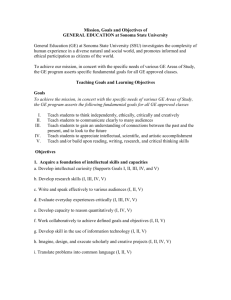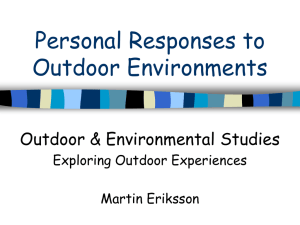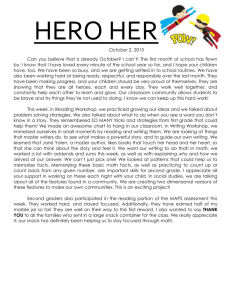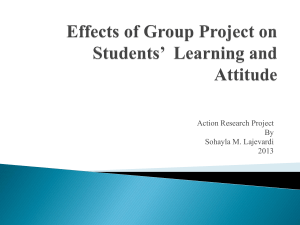MYP Aims by Subject Area
advertisement
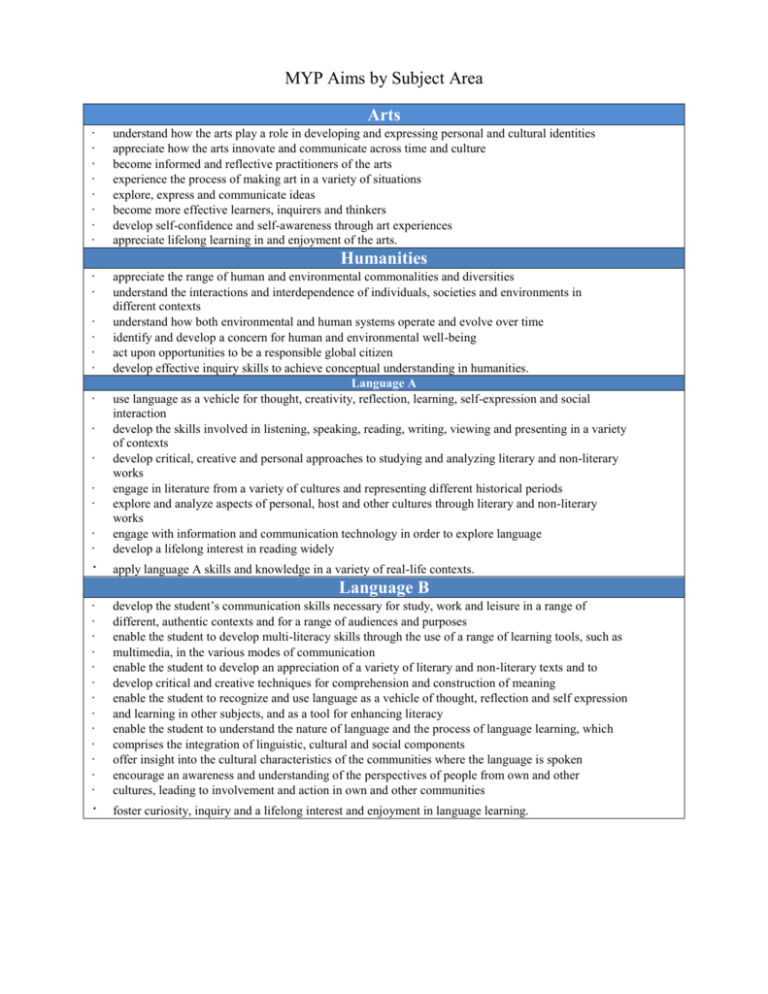
MYP Aims by Subject Area Arts • • • • • • • • understand how the arts play a role in developing and expressing personal and cultural identities appreciate how the arts innovate and communicate across time and culture become informed and reflective practitioners of the arts experience the process of making art in a variety of situations explore, express and communicate ideas become more effective learners, inquirers and thinkers develop self-confidence and self-awareness through art experiences appreciate lifelong learning in and enjoyment of the arts. • • • • appreciate the range of human and environmental commonalities and diversities understand the interactions and interdependence of individuals, societies and environments in different contexts understand how both environmental and human systems operate and evolve over time identify and develop a concern for human and environmental well-being act upon opportunities to be a responsible global citizen develop effective inquiry skills to achieve conceptual understanding in humanities. Language A use language as a vehicle for thought, creativity, reflection, learning, self-expression and social interaction develop the skills involved in listening, speaking, reading, writing, viewing and presenting in a variety of contexts develop critical, creative and personal approaches to studying and analyzing literary and non-literary works engage in literature from a variety of cultures and representing different historical periods explore and analyze aspects of personal, host and other cultures through literary and non-literary works engage with information and communication technology in order to explore language develop a lifelong interest in reading widely • apply language A skills and knowledge in a variety of real-life contexts. • • • • • • • • • • • • • develop the student’s communication skills necessary for study, work and leisure in a range of different, authentic contexts and for a range of audiences and purposes enable the student to develop multi-literacy skills through the use of a range of learning tools, such as multimedia, in the various modes of communication enable the student to develop an appreciation of a variety of literary and non-literary texts and to develop critical and creative techniques for comprehension and construction of meaning enable the student to recognize and use language as a vehicle of thought, reflection and self expression and learning in other subjects, and as a tool for enhancing literacy enable the student to understand the nature of language and the process of language learning, which comprises the integration of linguistic, cultural and social components offer insight into the cultural characteristics of the communities where the language is spoken encourage an awareness and understanding of the perspectives of people from own and other cultures, leading to involvement and action in own and other communities • foster curiosity, inquiry and a lifelong interest and enjoyment in language learning. Humanities • • • • • • • • • Language B Mathematics • • • • • • • • • • • • • • enjoy mathematics and to develop curiosity as well as an appreciation of its elegance and power develop an understanding of the principles and nature of mathematics communicate clearly and confidently in a variety of contexts develop logical, critical and creative thinking, and patience and persistence in problem solving develop power of generalization and abstraction apply and transfer skills to a wide range of situations including real life, other areas of knowledge and future developments appreciate how developments in technology and mathematics have influenced each other appreciate the moral, social and ethical implications arising from the work of mathematicians and the applications of mathematics appreciate the international dimension in mathematics through an awareness of the universality of mathematics and its multicultural and historical perspectives appreciate the contribution of mathematics to other areas of knowledge develop the knowledge, skills and attitudes necessary to pursue further studies in mathematics • develop the ability to reflect critically upon their own work and the work of others. Physical Education • • • an appreciation and understanding of the value of physical education and its relationship to a healthy, balanced lifestyle an interest in the promotion of health and wellness the motivation to participate fully in all aspects of physical education their optimal level of physical fitness effective communication strategies, verbal, non-verbal and written the skills and understanding necessary to participate successfully in a variety of physical activities, for example, learning, practicing, refining, adapting, thinking, interacting the ability to reflect critically on all aspects of physical education, including being a critical performer an understanding of international perspectives on physical activity, sport and health education • a lifelong interest in and enjoyment of physical activities as a participant • • • • • Science • • • • • • • • • • • • • • develop curiosity, interest and enjoyment towards science and its methods of inquiry acquire scientific knowledge and understanding communicate scientific ideas, arguments and practical experiences effectively in a variety of ways develop experimental and investigative skills to design and carry out scientific investigations and to evaluate evidence to draw a conclusion develop critical, creative and inquiring minds that pose questions, solve problems, construct explanations, judge arguments and make informed decisions in scientific and other contexts develop awareness of the possibilities and limitations of science and appreciate that scientific knowledge is evolving through collaborative activity locally and internationally appreciate the relationship between science and technology and their role in society develop awareness of the moral, ethical, social, economic, political, cultural and environmental implications of the practice and use of science and technology observe safety rules and practices to ensure a safe working environment during scientific activities engender an awareness of the need for and the value of effective collaboration during scientific activities. Technology • • • • • develop an appreciation of the significance of technology for life, society and the environment use knowledge, skills and techniques to create products/solutions of appropriate quality develop problem solving, critical and creative thinking skills through the application of the design cycle develop respect for others’ viewpoints and appreciate alternative solutions to problems use and apply information and communication technology (ICT) effectively as a means to access, process and communicate information, and to solve problems.
